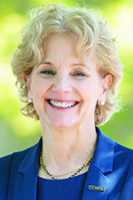
27 Jan Dean of UC Davis Discusses How To Encourage More Women To Become Neurologists
MedicalResearch.com Interview with:
Allison Brashear, M.D., M.B.A.
Dean, UC Davis School of Medicine
MedicalResearch.com: What is the background for this study? Why is the demand for neurology services and neurologists increasing?
Response: The American Academy of Neurology estimates that by 2025 the number of neurologists in practice will increase to 18,060 but some 3,400 more will be needed to meet the demand for their services. The 58% increase in the number of residency positions in the National Resident Matching Program since 2008 also reflects the growing demand. The higher prevalence of neurologic conditions, aging U.S. population and more patients having access to the health care coverage are the major driving forces. (Note: source of NRMP neurology trend data comes from a physician/resident forum posted May 2019 https://forums.studentdoctor.net/threads/growth-trends-in-neurology-residency-positions.1375918/)
MedicalResearch.com: Why is neurology included among the less desirable fields of medicine (similar to nephrology, infectious disease, endocrinology etc.) for medical students and residents to pursue? Why is burnout and dissatisfaction so high?
Response: According to the American Academy of Neurology, a minority of medical students choose to train in neurology each year, with approximately 3.1% matching into a neurology residency in 2018. The newer generations of neurologists value lifestyle and time off work more than their predecessors.
According to a recent American Medical Association survey, neurology tied with critical care as the medical specialty with the highest stress levels and burnout. Too many administrative tasks, too many hours at work, increased computerization of practice and insufficient compensation were among the top causes of burnout.
MedicalResearch.com: What can be done to make neurology a more lifestyle and fiscally rewarding field for today’s medical residents, who are often burdened with debt and family obligations?
Response: Addressing the root causes of burnout, increasing compensation and truly supporting work-life balance can help attract more interest in neurology as a career choice. According to the 2019 Medscape Neurology Compensation Report, total income for neurologists – including salary, benefits and bonuses – place it in the bottom half of all medical specialties. Lower compensation and high stress levels make it less appealing as a choice for one’s life work.
MedicalResearch.com: Since women now outnumber men in medical school classes, what can be done to specifically encourage more women to enter clinical and academic neurology?
Response: Encouraging women to pursue neurology as a career will require a significant change in culture to meet the needs of women – and men – who want work-life balance. Some changes include structuring positions to give more time to complete administrative tasks, offering more flexible work hours, providing daycare at the workplace, setting salaries at a level that encourages hiring help for daily tasks and chores in the home, and making it routine for all early career neurologists (men and women) to have mentors for personal and career support.
MedicalResearch.com: What else should readers take away from your report?
Response: I am committed to encouraging more women to choose neurology and to be leaders in Neurology. Being a neurologist lets you connect with patients, families and use problem-solving skills. The profession benefits from a diverse workforce. With female role models, we anticipate more women in neurology.
MedicalResearch.com: Any disclosures?
Response: None
Citation:
Schor, N.F & Brashear, A. (2019) Saving neurology. Neurology. doi.org/10.1212/WNL.0000000000008569.
JOIN OUR EMAIL LIST
[mailpoet_form id="5"]We respect your privacy and will never share your details.
Last Modified: [last-modified]
The information on MedicalResearch.com is provided for educational purposes only, and is in no way intended to diagnose, cure, or treat any medical or other condition. Always seek the advice of your physician or other qualified health and ask your doctor any questions you may have regarding a medical condition. In addition to all other limitations and disclaimers in this agreement, service provider and its third party providers disclaim any liability or loss in connection with the content provided on this website…..
Last Updated on January 27, 2020 by Marie Benz MD FAAD
